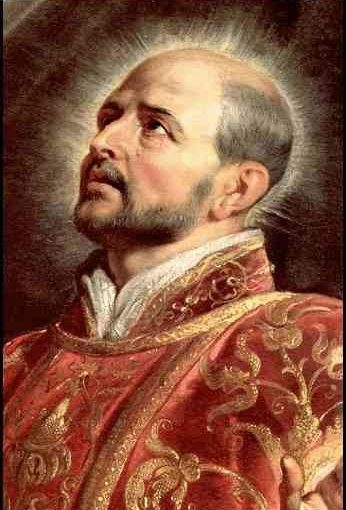“God freely created us so that we might know, love, and serve him in this life and be happy with him forever. God’s purpose in creating us is to draw forth from us a response of love and service here on earth, so that we may attain our goal of everlasting happiness with him in heaven. All the things in this world are gifts of God, created for us, to be the means by which we can come to know him better, love him more surely, and serve him more faithfully.”
—St. Ignatius Loyola
Tag: Jesuit saints and blesseds
St Francis Xavier
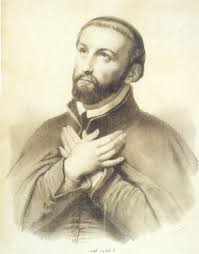 Francis Xavier has always held a special place in my heart. Being on mission is a singular grace given to for the sake of the Kingdom.
Francis Xavier has always held a special place in my heart. Being on mission is a singular grace given to for the sake of the Kingdom.
One of his biographers, Fr. Georg Schurhammer, SJ, has a 3 volume biography of Xavier that is quite moving and beautiful. Without exaggeration he is the greatest missionary Christianity has ever seen outside of St. Paul the Apostle. As the collect of his Mass says below, may we all be gifted with the zeal for the faith that he had!
“O God, who through the preaching of Saint Francis Xavier won many peoples to yourself, grant that the hearts of the faithful may burn with the same zeal for the faith and that Holy Church may everywhere rejoice in an abundance of offspring. Through our Lord Jesus Christ, your Son, who lives and reigns with you in the unity of the Holy Spirit, one God, for ever and ever.”
St Alphonse Rodriguez
 Among many saints and blesseds liturgically honored today (e.g., Saint Wolfgang & Blessed Theodore Romzha), we have the feast of the Jesuit Saint Alphonse Rodriguez, known for his extraordinary holiness that shone out of his ordinary work as the doorkeeper of a Jesuit school. Tremendous opportunities for holiness in the ordinary.
Among many saints and blesseds liturgically honored today (e.g., Saint Wolfgang & Blessed Theodore Romzha), we have the feast of the Jesuit Saint Alphonse Rodriguez, known for his extraordinary holiness that shone out of his ordinary work as the doorkeeper of a Jesuit school. Tremendous opportunities for holiness in the ordinary.
Why is Rodriquez’s feast so important? Because in him I see how Grace expanded the horizon of a person’s humanity shining the love of the Savior. He met the high and low at the door as the Lord wanted: with love and dignity. Plus, many thought that a laybrother of the Society of Jesus and a man with a very humble assignment of doorkeeper could be a saint; he produced no summa, no great record of baptizing or being martyred in a far away land. By the way, the Capuchins have several saints who were doorkeepers and we also have the noteworthy Saint André Bessette, a Brother of Holy Cross. Many times, I believe, the laybrothers are supreme witnesses to Christ and the promise of salvation; religious brothers show the Hundredfold as realizable.
What is memorable of Alphonse is a poem written by the Jesuit poet Gerard Manley Hopkins, number 49:
HONOUR is flashed off exploit, so we say;
And those strokes once that gashed flesh or galled shield
Should tongue that time now, trumpet now that field,
And, on the fighter, forge his glorious day.
On Christ they do and on the martyr may;
But be the war within, the brand we wield
Unseen, the heroic breast not outward-steeled,
Earth hears no hurtle then from fiercest fray.
Yet God (that hews mountain and continent,
Earth, all, out; who, with trickling increment,
Veins violets and tall trees makes more and more)
Could crowd career with conquest while there went
Those years and years by of world without event
That in Majorca Alfonso watched the door.
If you don’t know St. Alphonse, do yourself a favor and look up his biography.
St Peter Canisius
 Lord, you gave Saint Peter Canisius wisdom and courage to defend the Catholic faith. By the help of his prayers may all who seek the truth rejoice in finding you, and may all who believe in you be loyal in professing their faith.
Lord, you gave Saint Peter Canisius wisdom and courage to defend the Catholic faith. By the help of his prayers may all who seek the truth rejoice in finding you, and may all who believe in you be loyal in professing their faith.
“Have you read you Canisius today,” was the question school kids would ask each other referring to reading the catechetical texts composed by Fr Peter Canisius. His catechetical writings focussed on the Liturgy and the sacraments. The hallmark of Canisius and then his writings was his profound personal friendship with Jesus.
While we don’t use the saint’s catechism today, at least not in the USA, the question remains the pertinent to us –have we studied our catechism today?
Read Pope Benedict XVI’s 2011 brief biography on Canisius can be read here.
St Ignatius of Loyola
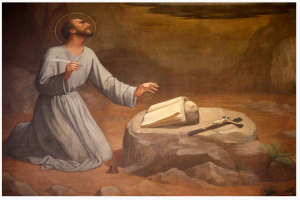 “God freely created us so that we might know, love, and serve him in this life and be happy with him forever. God’s purpose in creating us is to draw forth from us a response of love and service here on earth, so that we may attain our goal of everlasting happiness with him in heaven. All the things in this world are gifts of God, created for us, to be the means by which we can come to know him better, love him more surely, and serve him more faithfully. As a result, we ought to appreciate and use these gifts of God insofar as they help us toward our goal of loving service and union with God. But insofar as any created things hinder our progress toward our goal, we ought to let them go.” ― Ignatius of Loyola
“God freely created us so that we might know, love, and serve him in this life and be happy with him forever. God’s purpose in creating us is to draw forth from us a response of love and service here on earth, so that we may attain our goal of everlasting happiness with him in heaven. All the things in this world are gifts of God, created for us, to be the means by which we can come to know him better, love him more surely, and serve him more faithfully. As a result, we ought to appreciate and use these gifts of God insofar as they help us toward our goal of loving service and union with God. But insofar as any created things hinder our progress toward our goal, we ought to let them go.” ― Ignatius of Loyola
St Ignatius of Loyola
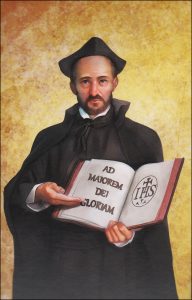 Today is the liturgical memorial of one of the most influential saints of the 16th century, Saint Ignatius of Loyola. His clarity of thought, his discernment of Spirits and determination to serve the Lord in everything is what set the world on fire with a new charism.
Today is the liturgical memorial of one of the most influential saints of the 16th century, Saint Ignatius of Loyola. His clarity of thought, his discernment of Spirits and determination to serve the Lord in everything is what set the world on fire with a new charism.
Our moment-to-moment task is to keep the Divine Name on our lips “His Name is like fire burning in my heart” (see Jeremiah 20:8), we ought to do everything to serve and love. By no other name are saved but Jesus’.
The Spiritual Exercises are a great gift to the Church; his rules of discernment, contemplation on Divine Love, and thinking with the Church are key to the spiritual life.
In the 16the century Loyola wanted to serve the Lord in model of Saint Dominic and Saint Francis; what ended up happening was a renewal in the manner by which the Church is apostolic — and he (and his spiritual sons had great success until the 1960s. Today, mentioning the word Jesuit is to say “I follow a left-leaning agenda.” One can think of various theologians, philosophers, writers and pastoral ministers who are ordained and professed members of the Society of Jesus. The disasters in ministry, hence, orchestrated by the Jesuits has been scandalous.
We need Loyola and the true beauty of the Society of Jesus; we need real men; we need men who will sacrifice themselves for the greater glory of God; we need Jesuits who will preach the received Gospel and to administer the sacraments according the to mind and heart of the Church. What we don’t need is the faithless Jesuits who do not think with the Church and follow closely what their sainted founder (and the patrimony of saints and blesseds) set out to do for Christ Jesus and His Church.
Saint Ignatius Loyola, pray for us!
St Aloysius Gonzaga: lived and died with the Holy Name on his lips
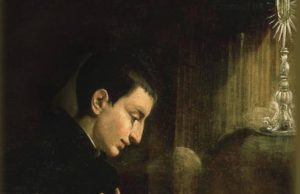 Saint Aloysius is admirable for several reasons –two come to mind. The first is reflected here:
Saint Aloysius is admirable for several reasons –two come to mind. The first is reflected here:
“He was baptized in the womb because his life was in danger. He received his First Holy Communion from Saint Charles Borromeo. At age nine he vowed virginity, and in spite of temptations of the princely courts his first innocence was sustained. He died in 1591, age 23, as a result of his devoted nursing of the plague-victims” (Daily Missal).
AND, then it is recorded that the last word he spoke was the Holy Name of Jesus.
Saint Aloysius Gonzaga, patron and model of youth, pray for us.
St Peter Canisius
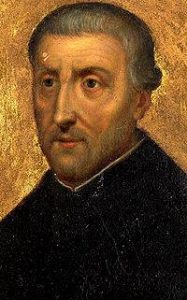 “At length, it was as if you [Lord] opened to me the heart in your most sacred body: I seemed to see it directly before my eyes. You told me to drink from this fountain, inviting me, that is, to draw the waters of my salvation from your wellsprings, my Savior. I was most eager that streams of faith, hope and love should flow into me from that source. I was thirsting for poverty, chastity, obedience. I asked to be made wholly clean by you, to be clothed by you, to be made resplendent by you.”
“At length, it was as if you [Lord] opened to me the heart in your most sacred body: I seemed to see it directly before my eyes. You told me to drink from this fountain, inviting me, that is, to draw the waters of my salvation from your wellsprings, my Savior. I was most eager that streams of faith, hope and love should flow into me from that source. I was thirsting for poverty, chastity, obedience. I asked to be made wholly clean by you, to be clothed by you, to be made resplendent by you.”
St Peter Canisius, pray for us.
St. Nicholas Owen
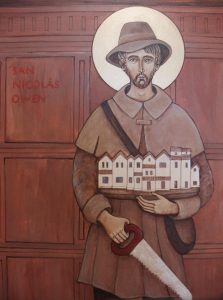 St. Nicholas Owen is one of the 40 Martyrs of England and Wales; he died in 1606. Own was the son of an Oxford carpenter becoming a carpenter himself. His personal mission was to secretly construct well-disguised ‘priest-holes’, or hiding places for hunted priests, during the night.
St. Nicholas Owen is one of the 40 Martyrs of England and Wales; he died in 1606. Own was the son of an Oxford carpenter becoming a carpenter himself. His personal mission was to secretly construct well-disguised ‘priest-holes’, or hiding places for hunted priests, during the night.
Nicholas Owen was a professed co-opperator (lay) brother of the Society of Jesus in England. On the mission, Owen served jail time for defending the martyred St. Edmund Campion. History shows that Nicholas masterminded the priest’s escape from the Tower of London and he was a wanted man after the Gunpowder Plot of 1605. His martyrdom was the usual English horror with his entrails burst open.
St Ignatius of Loyola
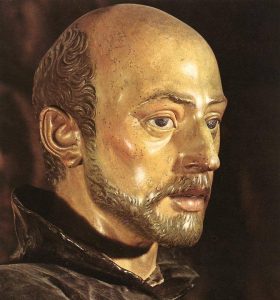 From the life of Saint Ignatius from his own words by Luis Gonzalez
From the life of Saint Ignatius from his own words by Luis Gonzalez
Ignatius was passionately fond of reading worldly books of fiction and tales of knight-errantry. When he felt he was getting better, he asked for some of these books to pass the time. But no book of that sort could be found in the house; instead they gave him a life of Christ and a collection of the lives of saints written in Spanish.
By constantly reading these books he began to be attracted to what he found narrated there. Sometimes in the midst of his reading he would reflect on what he had read. Yet at other times he would dwell on many of the things which he had been accustomed to dwell on previously. But at this point our Lord came to his assistance, insuring that these thoughts were followed by others which arose from his current reading.
While reading the life of Christ our Lord or the lives of the saints, he would reflect and reason with himself: “What if I should do what Saint Francis or Saint Dominic did?” In this way he let his mind dwell on many thoughts; they lasted a while until other things took their place. Then those vain and worldly images would come into his mind and remain a long time. This sequence of thoughts persisted with him for a long time.
But there was a difference. When Ignatius reflected on worldly thoughts, he felt intense pleasure; but when he gave them up out of weariness, he felt dry and depressed. Yet when he thought of living the rigorous sort of life he knew the saints had lived, he not only experienced pleasure when he actually thought about it, but even after he dismissed these thoughts, he still experienced great joy. Yet he did not pay attention to this, nor did he appreciate it until one day, in a moment of insight, he began to marvel at the difference. Then he understood his experience: thoughts of one kind left him sad, the others full of joy. And this was the first time he applied a process of reasoning to his religious experience. Later on, when he began to formulate his spiritual exercises, he used this experience as an illustration to explain the doctrine he taught his disciples on the discernment of spirits.
